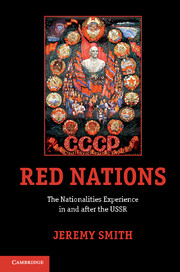Book contents
- Frontmatter
- Dedication
- Contents
- Tables
- Preface
- 1 Introduction: the prison-house of nations
- 2 Dispersal and reunion: revolution and civil war in the borderlands
- 3 Bolshevik nationality policies and the formation of the USSR: the Bolsheviks dispute national policy
- 4 Nation-building the Soviet way
- 5 Surviving the Stalinist onslaught, 1928–1941
- 6 The Great Patriotic War and after
- 7 Deportations
- 8 Territorial expansion and the Baltic exception
- 9 Destalinisation and the revival of the republics
- 10 Stability and national development: the Brezhnev years, 1964–1982
- 11 From reform to dissolution, 1982–1991
- 12 Nation-making in the post-Soviet states
- 13 The orphans of the Soviet Union: Chechnya, Nagorno Karabakh, Abkhazia, South Ossetia and Transdniester
- Conclusion
- Bibliography
- Index
Conclusion
Published online by Cambridge University Press: 05 June 2014
- Frontmatter
- Dedication
- Contents
- Tables
- Preface
- 1 Introduction: the prison-house of nations
- 2 Dispersal and reunion: revolution and civil war in the borderlands
- 3 Bolshevik nationality policies and the formation of the USSR: the Bolsheviks dispute national policy
- 4 Nation-building the Soviet way
- 5 Surviving the Stalinist onslaught, 1928–1941
- 6 The Great Patriotic War and after
- 7 Deportations
- 8 Territorial expansion and the Baltic exception
- 9 Destalinisation and the revival of the republics
- 10 Stability and national development: the Brezhnev years, 1964–1982
- 11 From reform to dissolution, 1982–1991
- 12 Nation-making in the post-Soviet states
- 13 The orphans of the Soviet Union: Chechnya, Nagorno Karabakh, Abkhazia, South Ossetia and Transdniester
- Conclusion
- Bibliography
- Index
Summary
The late Russian academic and moderate dissident Dmitri Likhachev was fond of making a distinction between two types of national feeling: ‘patriotism is the love of one’s country, while nationalism is the hatred of other peoples’. The distinction is not as straightforward as Likhachev supposed but he, perhaps unwittingly, had hit on a major paradox of nationalism. Most people in the industrialised world today, and this has been the case for a long time, see nationalism as motivating and providing coherence to the state communities they live in – or at least that is how they see their own nationalisms. But nationalism is also a source of discord and conflict, something which is whipped up in the course of verbal or military conflicts between nation-states, and which in many cases contributes to the emergence of those conflicts. Nationalism also provokes conflict within states, between the dominant nation and minorities, or between different minorities.
In the Soviet Union, conflict was never far away from the nationalities experience, but the focus of conflict shifted over time. With the breakdown of central authority in 1917–1920, the national question merged with the contest between town and country, and the three-way contest between representatives of the old imperial centre, the new revolutionary centre and the peripheries. Mostly, however, these conflicts were local, between Russians and non-Russians or Reds and Whites in particular areas, not between Russia and the borderlands, at least until the Civil War was settled. Where the contest involved scarce resources such as land, or territorial claims between new states, it took an especially violent form.
- Type
- Chapter
- Information
- Red NationsThe Nationalities Experience in and after the USSR, pp. 358 - 364Publisher: Cambridge University PressPrint publication year: 2013



